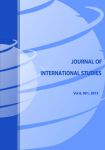FROM THE RUSSIAN FOOD IMPORT BAN TO FREE TRADE FROM LISBON TO VLADIVOSTOK – WILL FARMERS BENEFIT?
FROM THE RUSSIAN FOOD IMPORT BAN TO FREE TRADE FROM LISBON TO VLADIVOSTOK – WILL FARMERS BENEFIT?
Author(s): Martin Banse, Ivan Duric, Linde Götz, Verena LaquaiSubject(s): Geography, Regional studies, Agriculture, International relations/trade, EU-Accession / EU-DEvelopment
Published by: Fundacja Centrum Badań Socjologicznych
Keywords: EU; Eurasian Economic Union; free trade area; import ban; MAGNET; Russia;
Summary/Abstract: With the implementation of the Russian import ban as a countermeasure to the EU sanctions in the context of the Ukrainian crisis, trade relations between the EU and Russia reached their lowest level in 2014. In this paper, we model several trade policy scenarios and assess their effects on domestic agricultural production and trade in Russia, the EU and Germany for the 2020-30 period. The results of the applied general equilibrium MAGNET model suggest that the removal of the Russian food import ban will affect Russian agricultural production to a limited extent only, while there will be no effect on the EU. In contrast, depending on how competitive Russian farmers’ become, the creation of a large free trade area from Lisbon to Vladivostok would generally benefit farmers in the EU more than farmers in Russia.
Journal: Journal of International Studies
- Issue Year: 12/2019
- Issue No: 4
- Page Range: 20-31
- Page Count: 12
- Language: English

